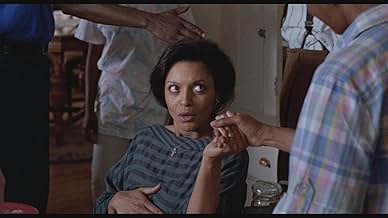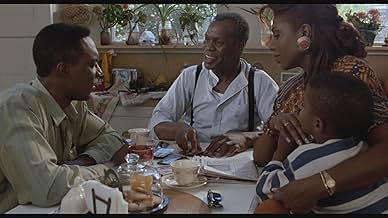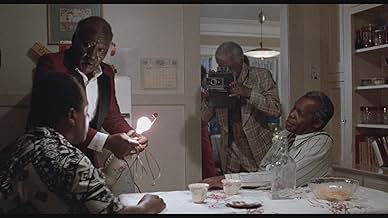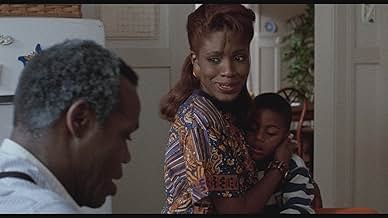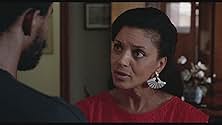To Sleep with Anger
- 1990
- Tous publics
- 1h 42m
IMDb RATING
7.1/10
3.3K
YOUR RATING
A charismatic old acquaintance drifts into town, stirring up trouble for a mild-mannered family.A charismatic old acquaintance drifts into town, stirring up trouble for a mild-mannered family.A charismatic old acquaintance drifts into town, stirring up trouble for a mild-mannered family.
- Awards
- 7 wins & 13 nominations total
DeVaughn Nixon
- Sunny
- (as Devaughn Walter Nixon)
DeForest Covan
- Fred Jenkins
- (as DeForest Coven)
- Director
- Writer
- All cast & crew
- Production, box office & more at IMDbPro
Featured reviews
For the last several visits to the video store, I've been drawn to this film, but it wasn't until a few days ago that I finally rented it. And I'm really glad I did.
This film glows with delicately-drawn character studies. It is a testament to the effectiveness of subtle storytelling. The story is good, and the characters are gentle but passionate. They are middle class folks who live in a pleasant neighborhood in LA. They have left the hardscrabble life of the South -- with all the attendant superstitions and fears -- behind. Or so they hope...
The responses that the characters have to the presence of evil in their midst are refreshing and true. Though the film is subtle, it never drags, gets sentimental, or sloshes into easy cliches.
Danny Glover is wonderful, but so are most of the other actors. Oh, it's about family, but in a way that attracts us. There are no tried and true gimmicks, no diseases du jour, no soapy interludes. Just people. Doing the best they can. They are sometimes funny, sometimes foolish, sometimes predictable. One thing we notice: they can seem excessively patient with out-of- town visitors...
This film glows with delicately-drawn character studies. It is a testament to the effectiveness of subtle storytelling. The story is good, and the characters are gentle but passionate. They are middle class folks who live in a pleasant neighborhood in LA. They have left the hardscrabble life of the South -- with all the attendant superstitions and fears -- behind. Or so they hope...
The responses that the characters have to the presence of evil in their midst are refreshing and true. Though the film is subtle, it never drags, gets sentimental, or sloshes into easy cliches.
Danny Glover is wonderful, but so are most of the other actors. Oh, it's about family, but in a way that attracts us. There are no tried and true gimmicks, no diseases du jour, no soapy interludes. Just people. Doing the best they can. They are sometimes funny, sometimes foolish, sometimes predictable. One thing we notice: they can seem excessively patient with out-of- town visitors...
Danny Glover shows up at the door of his old friends and moves in. Over the next few weeks, a lot of stuff happens.
Charles Burnett's movie seems to be a slice of life piece, showing the variety and contradictions of a small Black community, nominally in Los Angeles. There are tough guys and weak guys, but it's a solid working-class community where the choir sings polite gospel, and the preacher comes to visit the visit and chide them for using "old-fashioned" obeah cures instead of prayer.
This isn't the world of rap or youth, but of the older, settled community. In some ways it seems idyllic, with no drug dealers or gang violence, the standard modern cinematic image of Black communities. There's no rap music, but there is the blues and a small boy playing a trumpet very loudly.
It's warm and frequently silly, and beneath it is a had recognition of being unregarded. I found it very familiar, and if the older folks had been speaking Yiddish, i might have been, if not my own home growing up, then a cousin's, or that of one of my father's old friends.
Charles Burnett's movie seems to be a slice of life piece, showing the variety and contradictions of a small Black community, nominally in Los Angeles. There are tough guys and weak guys, but it's a solid working-class community where the choir sings polite gospel, and the preacher comes to visit the visit and chide them for using "old-fashioned" obeah cures instead of prayer.
This isn't the world of rap or youth, but of the older, settled community. In some ways it seems idyllic, with no drug dealers or gang violence, the standard modern cinematic image of Black communities. There's no rap music, but there is the blues and a small boy playing a trumpet very loudly.
It's warm and frequently silly, and beneath it is a had recognition of being unregarded. I found it very familiar, and if the older folks had been speaking Yiddish, i might have been, if not my own home growing up, then a cousin's, or that of one of my father's old friends.
Maybe it was the bizarre photo of a smirking, card-holding Danny Glover that always gave me the wrong impression of this film. I'm not entirely sure what I expected it to be, but I'm relatively certain I wasn't expecting a quiet family drama.
Writer/director Charles Burnett doesn't reach hard for big statements. The film appears to take place in the 1950s-60s (I couldn't be sure), but the time period isn't chosen out of a desire to create a plot focused on race relations. In fact, the drama is entirely centered around a single small family, and a wild friend from way in the past (Harry, played by Danny Glover). Cinematographer Walt Lloyd creates a familiar environment, whether or not it happens to be personally familiar to the viewer. Everything feels warm and slightly worn, including personalities and ways of speaking.
Although my personal family history couldn't be more different than the family depicted in this film, the character of Samuel "Babe Brother" (Richard Brooks) really hit home for me. His attitude on life and relationship with his father mirrors my own all too closely. It's the honestly of character depiction and interaction that brings out so much truth from Charles Burnett's writing. Everything comes together to make a perfectly realized story of absolute truth. This may just be a great film.
Writer/director Charles Burnett doesn't reach hard for big statements. The film appears to take place in the 1950s-60s (I couldn't be sure), but the time period isn't chosen out of a desire to create a plot focused on race relations. In fact, the drama is entirely centered around a single small family, and a wild friend from way in the past (Harry, played by Danny Glover). Cinematographer Walt Lloyd creates a familiar environment, whether or not it happens to be personally familiar to the viewer. Everything feels warm and slightly worn, including personalities and ways of speaking.
Although my personal family history couldn't be more different than the family depicted in this film, the character of Samuel "Babe Brother" (Richard Brooks) really hit home for me. His attitude on life and relationship with his father mirrors my own all too closely. It's the honestly of character depiction and interaction that brings out so much truth from Charles Burnett's writing. Everything comes together to make a perfectly realized story of absolute truth. This may just be a great film.
"To Sleep with Anger" It is one of the richest film experiences I've had in a very long time. Since I saw it in 1993, no other American film has seemed as winning and varied as this one. It is a film I return to again and again, for the brilliant ensemble cast, the witty writing and the blend of humor, folklore and tragedy. There are no cinematic pyrotechnics. Mr. Burnett's approach to filmmaking is deceptively simple and yet his film seems far richer and more cinematic than many a more "sophisticated filmmaker". Mr. Burnett has taste and economy. He knows where to place his camera for the greatest effect and how to edit his films in a way that enhances the drama of each scene, rather than using edits to manufacture drama in a scene that is dramatically inert. He is a filmmaker of integrity and genius. This is his masterpiece.
This film involves a black family in southern California. They have a rather autocratic father who is impatient but also kind. There are two brothers who are polar opposites. One is shiftless and married and searching for a place in the world. The other is hard working and settled but also rather dull. Then an old friend named Harry shows up. He is played by the gregarious Danny Glover. The problem is this guy is evil but charming. Soon bad things happen. I rented this blindly and am glad I got a chance to watch it. It has a wonderful cast with Richard Brooks as the wayward son and several other fine actors.
Did you know
- TriviaIn 2017, the film was selected for preservation in the United States National Film Registry by the Library of Congress as being "culturally, historically, or aesthetically significant".
- Quotes
Harry: Ya, but you can't do the shuffle with one leg. You and your wife, in fortunate. Now I'm not talking about you and what you do but some folks that always run to help the victim, deep down are attracted to pain and suffering and love to be near the dying.
Junior: All the people working with us are really doing it 'cause they hate to see suffering.
Harry: You never know what's in the heart and just because you can cry doesn't make you human.
- ConnectionsReferenced in Siskel & Ebert & the Movies: Congo/The Glass Shield/Pocahontas/Fluke (1995)
- SoundtracksPrecious Memories
Traditional, attributed to J.B.F. Wright
Performed by Sister Rosetta Tharpe (as Sister Rosetta Thorpe)
Courtesy of SAVOY Records
- How long is To Sleep with Anger?Powered by Alexa
Details
Box office
- Gross US & Canada
- $1,161,135
- Opening weekend US & Canada
- $19,295
- Oct 14, 1990
- Gross worldwide
- $1,161,135
- Runtime
- 1h 42m(102 min)
- Color
- Sound mix
- Aspect ratio
- 1.85 : 1
Contribute to this page
Suggest an edit or add missing content


